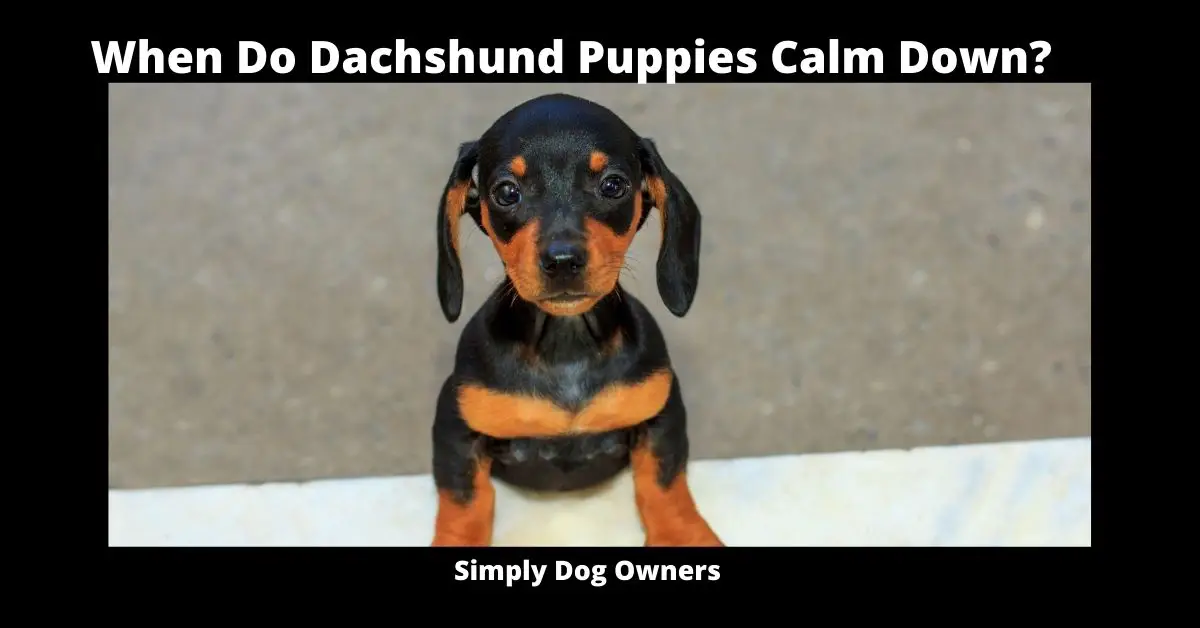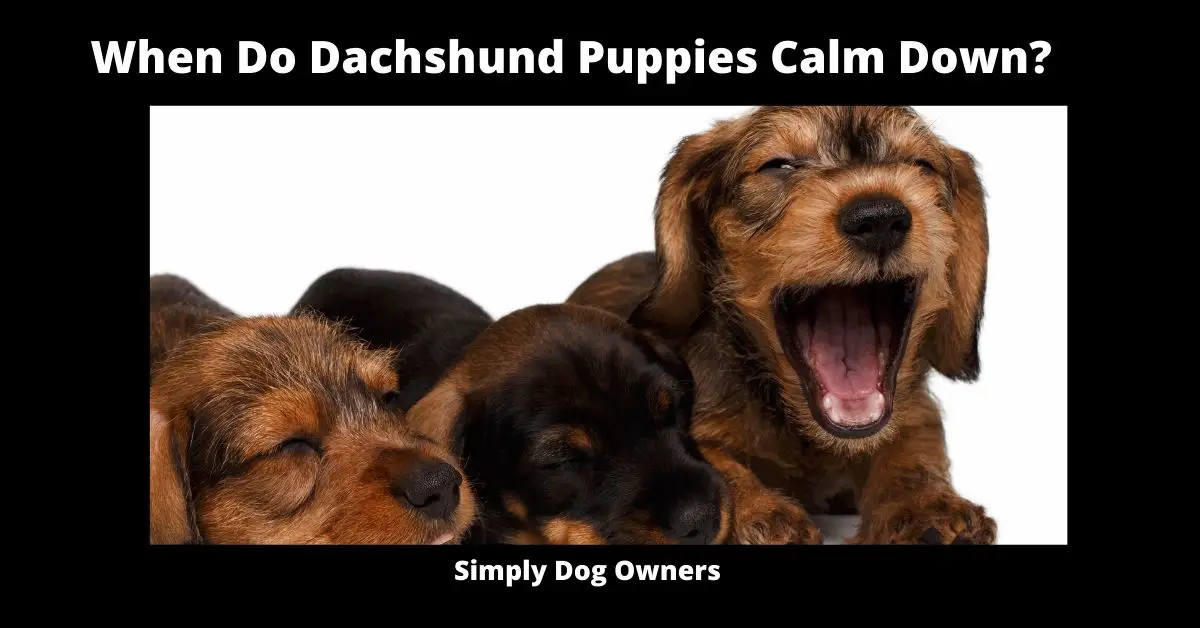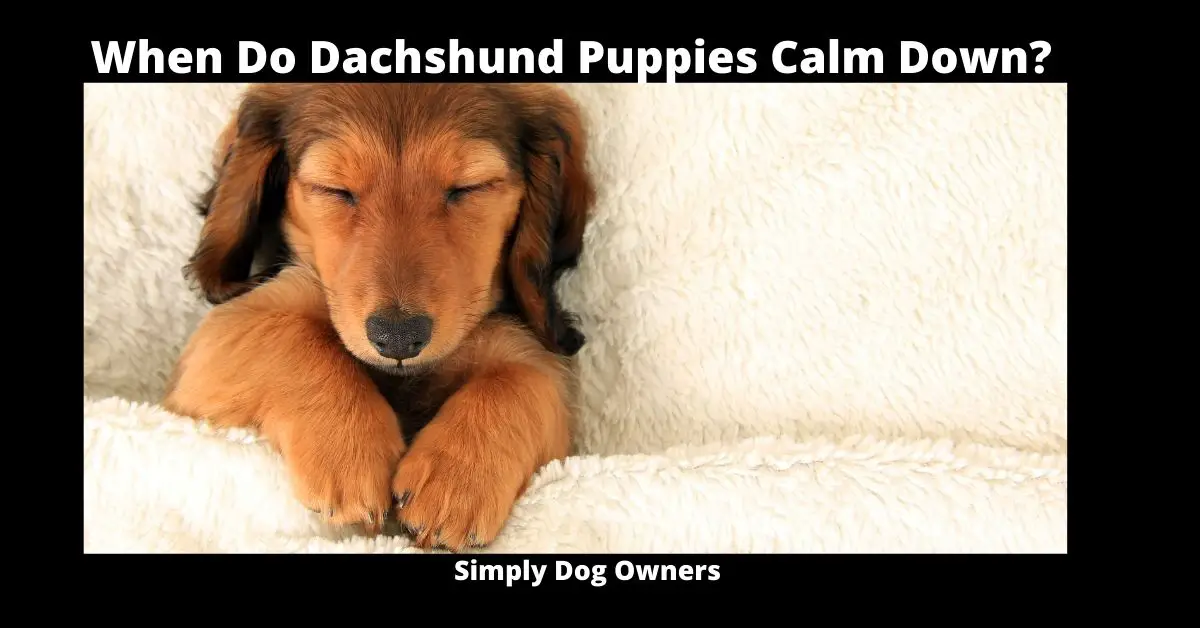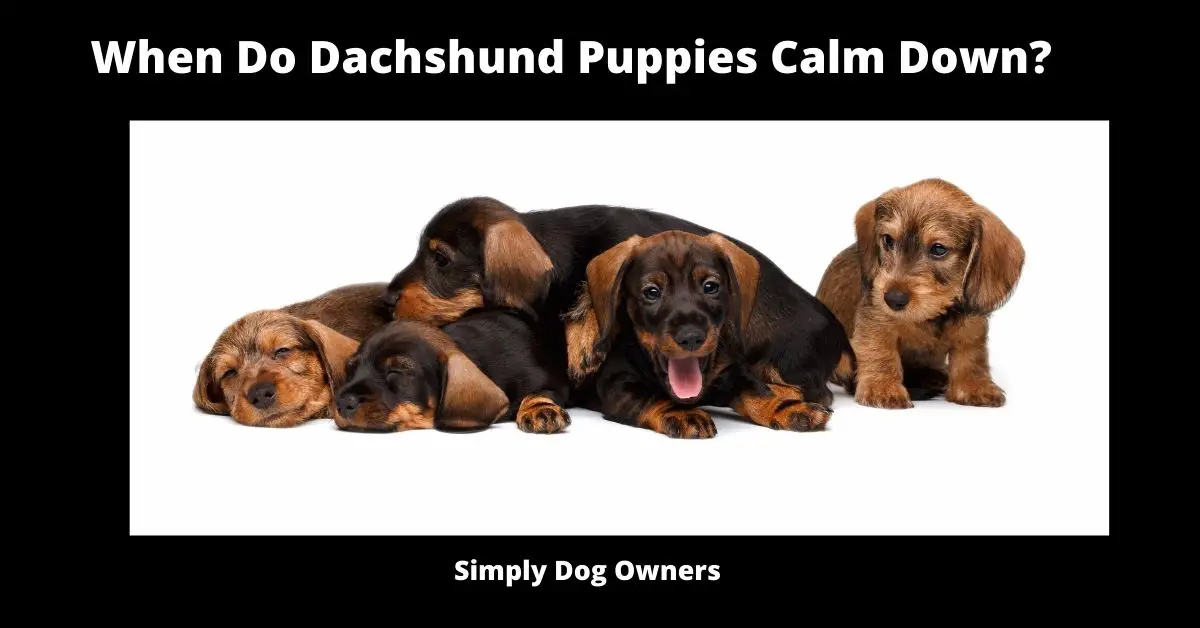What is the best age for dachshunds to calm down? I’ve found that most small breed puppies start calming at about 1 year of age. As with many other breeds, this can be a beginning point where they take their time and explore more calmly before getting into trouble!
When Do Dachshund Puppies Calm Down?
Many people get Dachshund puppies because they are small, cute, and can easily be kept in a small apartment. However, these dogs don’t calm down until about six months of age. Until then, they will bark at things that startle them or chase anything that moves. This is the most important thing to consider before you adopt one of these little creatures! When Do Dachshund Puppies Calm Down?
What is Common Dachshund Puppy Behavior Challenges?
Puppy behavior challenges can vary based on the individual dog, but there are some common issues that affect a high percentage of dachshund puppies.
Some of the Challenges are:
- Peeing Dachshunds are prone to having accidents in the house, and it can take time and patience to get them properly trained. A good training plan for housebreaking includes using a crate, which can give your puppy the security he needs while you’re gone. A portion of his meals should be served in the crate to reinforce positive behavior with treats and praise when they go into their “den” potty where it belongs!
- Jumping on Furniture Another common dachshund behavior challenge is jumping on furniture. This can be a big problem if you have small children, who might not appreciate the puppy’s presence as he jumps up onto their laps or pounces at them for playtime in the middle of watching TV.
- Digging – Dachshunds are natural diggers, which is one reason they were originally bred to hunt badgers. This behavior can be cute when your puppy does it in the yard, but not so much if he decides to take up digging on your new living room carpet!
- Barking – Doxies often have a high-pitched bark that many people think sounds like yapping or crying rather than barking. This trait makes them particularly prone to barking excessively for no particular reason at all! If this starts happening you might want to consider taking him outside more frequently and giving him plenty of exercises each day.
- Biting – Dachshund puppies are cute, but this does not mean that they should be treated like stuffed toys. Remember to use proper caution and supervision when playing with your puppy to avoid any accidental bites!
- Chewing – Doxies were originally bred for hunting badgers in Germany. They can sometimes exhibit a natural instinct to dig through the earth after prey. Make sure you supply him plenty of chew items he is allowed to play with, such as bully sticks or Nylabones.
- Humping – In addition to excessive barking, dachshunds also tend towards humping behavior at times. This problem tends most often afflict unneutered males (or females!) and may require veterinary treatment if it persists into adulthood. It
- Licking – Lastly, some dachshunds may develop a licking habit. This can be due to anxiety, boredom, or even attention-seeking behavior. If your puppy is constantly licking you or other family members, it might be helpful to provide him with more toys and activities to keep him occupied.
- Aggression – It is important to remember that dachshunds are still dogs and as such, they have the potential to exhibit aggressive behavior. This can be towards people, other animals, or even inanimate objects like furniture. If your puppy displays any signs of aggression it is best to consult with a qualified professional trainer or behaviorist for help.
- These are just a few of the most common dachshund behavior challenges that new owners may face. By being aware of these issues ahead of time, you can take steps to train and correct them before they become bigger problems down the road!
What is Puppy Dachshund Separation Anxiety?
Dachshunds are one of the most popular breeds of dogs in the United States. They are also one of the breeds that are most prone to separation anxiety. Puppy Dachshund Separation Anxiety is a condition where a dog becomes agitated and stressed when it is separated from its owner. This can lead to a wide range of destructive behaviors, including chewing on furniture, barking excessively, urinating or defecating inside the home, and even escaping from the house in an attempt to find its owner.
If you are noticing signs of separation anxiety in your Dachshund puppy, there are steps you can take to help him overcome his fear. The first step is to make sure that you are not inadvertently reinforcing his behavior. In other words, you need to be sure that the things your Dachshund does when he is alone are making his separation anxiety worse rather than better. For example, if he chews on furniture while you’re out of the house, it’s natural to yell at him and tell him not to do this because it makes a mess in your home. However, yelling at him will only make the problem worse since dogs don’t understand language, as well as humans, do — they rely more heavily on tone and body language (source).
Instead of scolding or punishing your puppy for behaving inappropriately when you leave the house, try giving her something else she can chew on instead such as an antler or rawhide bone so she can get her chewing urges out. Make sure to monitor your Dachshund closely so that he does not choke on his new chew toy, and always make sure the item is too large for him to swallow or digest in its entirety since some bones can splinter if they are chewed up into smaller pieces.

While you may have heard of giving dogs peanut butter as a treat, it’s best to avoid this because most dog owners don’t realize how easy it is for them to ingest enough peanut butter through licking alone to cause an allergic reaction (source). It also has a high fat content which makes it very unhealthy for dogs — even those with short hair coats like Dachshunds (source)!
If you notice signs of separation anxiety in your Dachshund puppy and are worried about his destructive behavior, you should keep him confined to a small room like a laundry or bathroom while you’re gone so that he is not able to cause damage with his chewing. If possible, give him the chew toys mentioned above while making sure they remain out of reach when he’s unattended — this will help distract him from being anxious and frustrated since dogs do not understand concepts such as time (source).
Another thing you can do to discourage separation anxiety in a Dachshund puppy is provide her with plenty of exercises before leaving for work or taking long trips away from home. Exercise helps tire them out both physically and mentally which makes it harder for them to be anxious over things like being left alone. A tired dog is a happy dog, and an anxious dog is a calm dog!
Finally, if your Dachshund puppy’s separation anxiety is proving to be too difficult to manage on your own, you may want to consider seeking the help of a professional behaviorist or trainer. They can help you develop a plan that specifically targets the root of your pup’s anxiety and helps him overcome it in a safe and healthy way. Never punish or scold your Dachshund for his symptoms of separation anxiety — this will only make him more fearful and stressed, leading to further behavioral problems down the road. With patience, love, and some guidance from a professional, you can help your Dachshund puppy
How To Stop Excessive Barking?
Step One: Stop the dog from barking by taking away the stimulus.
Step Two: Distracting them with a favorite toy or treat can help as well.
There are several ways to stop your dog from excessive barking and I hope this has helped you find some great resources for making it easier on both of you! Excessive Barking is not only annoying but also harmful over time to your neighbors so take steps now to make sure that doesn’t become an issue in the future
How To Stop Excessive Peeing?
It is really good to begin potty training your Dachshund puppy early on because it will make things so much easier on you when you are an adult.
First Step – The first step to potty training a Dachshund puppy is taking them outside frequently — every hour if possible, or as soon as you notice them beginning to sniff around in circles and squat down on their hind legs (source). Take your dog by the leash with you each time until he learns that this means his business is finished for now, then gives him lots of praise and affection when he relieves himself outside. After repeating this several times over the course of a few days while gradually increasing the amount of time between trips outdoors, most puppies eventually start going potty only outside which makes life much more convenient for everyone involved!
Second Step – If you find that your Dachshund is still going potty inside the house, try taking him outside and rewarding him with treats or favorite toys as soon as they begin to squat down — this will hopefully remind them of what it means when they sniff around in circles.
Third Step – If he’s not catching on after a few days, there are several products out there like the Squat-Pee Trainer which can help dogs learn how to eliminate only outdoors (source). These work by attaching a special pouch full of pennies to their hind legs so that every time they attempt to relieve themselves indoors while wearing one, they get sprayed with water which helps keep them from associating relieving themselves indoors with anything pleasurable.

How to Stop Dachshund Puppy Biting?
Before we explore how to stop Dachshund puppies from biting, let’s first know what is aggressive puppy behavior. Puppies who bite their owners are not being mean or trying to hurt them on purpose. Rather it is a natural instinct in the dog that if he bites then his owner will remove its hand and give him attention.
The best way of stopping this kind of behavior before it becomes an established habit is by never giving the puppy any form of attention for doing so. It could be done by simply ignoring him when he does something inappropriate rather than rewarding him with your affection, which only encourages further bad habits like nipping and pulling at clothes etc
Such behavior can be stopped early provided you have taken immediate steps upon noticing it. This is because, if ignored or not taken care of early on, the bad behavior could develop into something even more severe and difficult to correct later in life.:
The first rule – never hit your puppy! You can break his spirit. It may seem hard but remember- hitting does not mean spanking or beating. You can just ignore your puppy and leave the room, so he understands they are not being rewarded for their bad behavior
There may be instances where you might have to put your dog into a time-out if he is destructive or aggressive. For this purpose, it’s good to get an area designated as the ‘time-out spot’ beforehand instead of cornering him in front of the television while watching some show that has his focus on it. This will help reduce any anxiety from isolation due to punishment
Puppies learn more through association than actual teaching. So by associating something negative with biting such as using bitter spray around them when they do wrong could really prove useful in future training sessions, along with treats every time they display good behavior.
The key to stopping a Dachshund puppy from biting is consistency and patience on your part, along with lots of positive reinforcement when he does things right!
- Sharp Command
- Do not encourage it
- Water Spray
How to Stop Dachshund Puppy Chewing on Furniture?
Step One- Chew Toy
If the dachshund puppy is still teething and chewing, then you need to buy a chew toy or some other things that can satisfy his need for gnawing. It would be better to give him something safe like rawhide rather than your favorite pair of shoes! Remember: never hit or yell at your dog when he makes mistakes – this will only frighten him and make training harder.
Step Two- Proper Dog Discipline Training
To stop Dachshund from eating furniture, you also have to learn how to discipline dogs properly. You should always know what are the best ways which work in order not just punish them but teach them as well. Visit my site here if you want more information on it.
Step Three- Crate Training
Dachshund puppies should be crate trained properly to avoid having accidents in the house. Crates are a great invention, which helps you leave your dog alone without worry and they also teach dogs self-control.

How to Crate Train a Dachshund Puppy?
- Dachshund puppies are prone to potty training accidents, so it’s important to start crate training them as early as possible. Here are a few tips on how to crate train your Dachshund puppy:
- Start by putting the puppy in the crate for short periods of time and gradually increase the amount of time they spend in thereReward your puppy when they go in the crate and stay calm while inside.
- If the puppy has an accident in the crate, don’t scold them – just clean it up and start again. Dog generally do not soil in their cage unless they cannot hold it any longer.
- Make the crate a happy place for your puppy by putting some toys and treats inside. This will help them feel comfortable in their new surroundings.
- If you follow these tips, you should be able to successfully crate train your Dachshund puppy in no time!
Final Thoughts – When Do Dachshund Puppies Calm Down?
In summary Dachshund Puppies generally begin calming down at around 12 months of age. While you are waiting take the opportunity to train your puppy in proper behavior.
